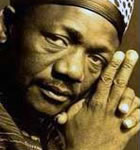|
||||||||||||||
|
||||||||||||||
in 1972 a back-to-African-roots trend with a stylistic mix of Western pop and local highlife .He later broadened it to include the rapidly spreading gospel of reggae. His diversity has kept him from being pigeonholed. Ozziddi's first few releases, with their catchy, rock-inflected melodies and topical lyrics, were all big hits in Nigeria, but 1977's "Fire in Soweto" really put Okosun on the map internationally.
He sang in his native Edo language as well as Yoruba and English. Known for his unrepentant defence of the June 12, 1993 mandate of the late Social Democratic Party presidential candidate, Chief M.K.O Abiola, Evangelist Okosuns was also an outspoken supporter of the last Chief Olusegun Obasanjo administration. An avant-garde musician in his own right, Okosuns' early music of the 70s and 80s would be contextualised in the making of contemporary music of revolution in the Nigerian musical scene. With more than 39 album releases to his credit, many of them gold, Nigeria's Okosuns initially caught the pop music bug via Elvis and the Beatles, forming his first band, The Postmen, in 1964.
Further attention came in the early '80s with the release of "Liberation," a "best-of" compilation on the American Shanachie label, and a number of international tours. "Okosun's supposed 'controversial' lyrics in the 1970s and 1980s about South Africa and the plight of the Third World were actually not at all radical in the African context. In this regard it is interesting to compare Okosun's career with that of Fela Anikulapo-Kuti, who faced genuine hardship as a result of his pointed attacks on the Nigerian elite," said Mr Beadle. Apart from the general appeal and catchiness of his tunes, Okosun addressed political and social issues in his tunes, said the site. "… Not on the direct, in-your-face, these-are-Nigerian-issues style of Fela Kuti, but more on a pan-African 'stop the wars, let's progress' tempo with tracks like Revolution, Now or Never, Fire in Soweto, etc. "Another prominent theme is religion, namely Christianity, where he sings various praises to Oluwa. An example is in the 1983 release Sonny Okosun - Olorun Mose on the Togetherness 12... As with most of Okosun's music, the instrumentation on this track is almost entirely western, save for the talking drum in the very beginning." He was featured in Black Star Liner, a 1983 anthology of African reggae, and more recently appeared on the anti-apartheid Sun City EP produced by Steve Van Zandt. When the apartheid regime collapsed in 1989, Evangelist Okosuns cut another blazing path when he set the trail in the new blitz called gospel music. The new genre of music from the stables of Evangelist Okosuns who by now had added an s to his surname came in form of an album entitled Songs of Praise. Released under the new management of Ivory Music (former EMI), Songs of Praise, like wild fire, swept through the country, again establishing the Evangelist as a force to be reckoned with in the music industry. Revival, another successful album, followed and soon the born-again fever gripped the Ishan-born artist and who by this time was already deeply involved with spreading the gospel. In 1998, he founded the House of Prayer Ministry, converting part of his expansive building to a church. He was famous for his prowess to discover star artistes, including "One Love" diva, Onyeka Onwenu, and samba crooner, Stella Monye, among others. Okosun gave up the ghost on May 24, 2008 at the Howard University Hospital, Washington D.C., United States of America, after a futile search for a cure for cancer that made the once buoyant musician a shadow of his old self.He was 61.
Last update 07-08-2011
|
||||||||||||||
|
| ||||||||||||||







